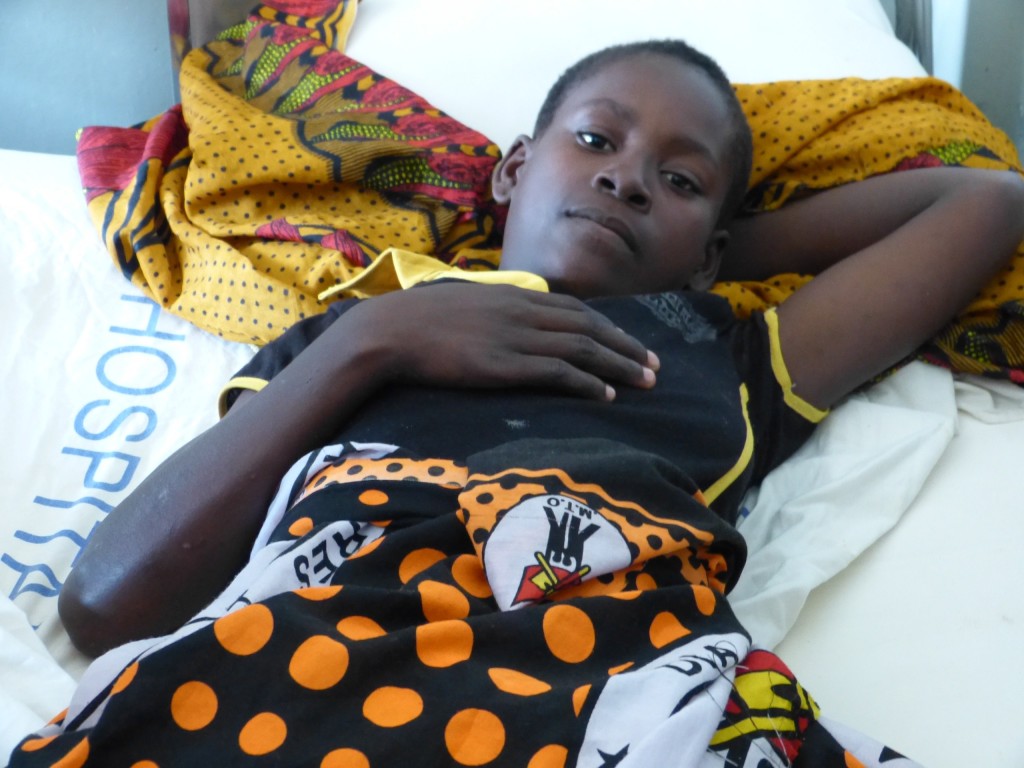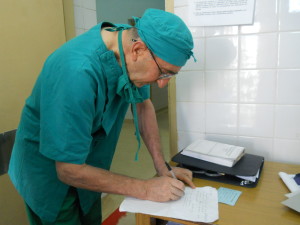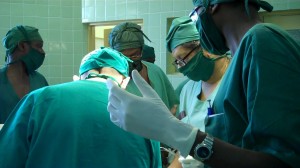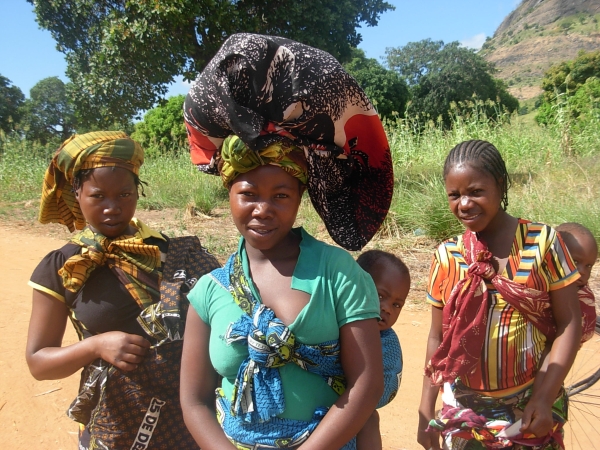As the only surgeon for more than half a million people in Tete province, he might do 10 operations a day, besides regular medical consultations. While in Mocuba, in [...]]]>

A 15-year-old girl, who was married at age 14, endured two days of obstructed labour, had a stillborn baby, and developed obstetric fistula, recovers from fistula surgery at Nampula Central Hospital, Mozambique. Every year, some 400 women develop obstetric fistula in Mozambique – most are teen mothers and child brides. Credit: Mercedes Sayagues
As the only surgeon for more than half a million people in Tete province, he might do 10 operations a day, besides regular medical consultations. While in Mocuba, in Zambezia province, he performed 1,500 surgeries in one year. The days were long, the conditions harsh, the lack of medical supplies serious. In the mid-1980s, he was happy to welcome the North Vietnamese doctors sent as aid workers. Although they did not share any common language, they were company and shared the long work days.
Marchesini, an Italian priest and doctor, arrived in Mozambique in 1976, just after independence, and just as civil war broke out.
Among all the horrors of war – landmines, bullets, amputations, mutilations, and malnutrition – one plight particularly moved him: the women with obstetric fistula, estimated to be 100,000 in the country.
Obstetric fistula is a lesion that causes a hole in the tissue of the vagina, the urethra or the rectum, leading to urinary or faecal incontinence. It is caused by long and complicated births without proper medical care, when for days the baby’s head pushes on the surrounding tissue, tearing them, according to the United Nations Population Fund.

Father Aldo Marchesini processing paperwork in-between operating obstetric fistulas at Beira Central Hospital, in Mozambique. Credit: Mercedes Sayagues/IPS
Marchesini had learned to operate fistula with a missionary in Uganda. In Mozambique, he mastered the delicate surgery and he trained all the local doctors who operate fistula today. Marchesini taught them not only the skills, but the passion and compassion that infuse his work. This earned him the 2014 United Nations Population award, shared with Johns Hopkins University, which will be presented in New York on 12 June.
Every year since 1985, Marchesini and his team of doctors stage “fistula campaigns” in the central and northern provinces. Women from remote districts come to referral hospitals to be free of the incontinence, shame and social exclusion that fistula brings.
Not only did Marchesini operate, he also raised funds in Italy for hospital and transport costs and to help these women start a new life selling used clothes in their homes.
Early on, Marchesini realized that media, especially community radios, were key in the campaign against fistula. Journalists can explain how to avoid it (give birth in hospital, discourage early marriage and pregnancy) and can inform women about treatment and cure. Talking to media was part of Marchesini’s job.
Sometime in the late 1990s, Marchesini contracted HIV, probably, as he told me, “from delivering babies and operating without surgical gloves, which were scarce during the war.” He discovered his status in 2002, during a medical check-up in his home country, Italy, for a stubborn bronchitis.

Marchesini (left front), operating with his team in Beira, has taught every surgeon who repairs obstetric fistulas in Mozambique. Credit: Mercedes Sayagues/IPS
“I felt that my life, until then in the same railway carriage as everybody else, had suddenly gone on another train and another railway to a new destination,” he told me. He immediately started on antiretrovirals.
When he returned to Mozambique, although at the time AIDS was surrounded by shame and stigma, Marchesini did not hesitate in going public with his status, to show that HIV knows no social boundaries and that one can live positively with the virus.
He was the first and practically remains the only professional person who is publicly open about living with the virus in Mozambique, where stigma doggedly clings to HIV.
Marchesini’s adventures and reflections as the lone surgeon during the war are recorded in his memoirs, scattered chapters in a lively prose, written in Italian and Portuguese when he goes on holiday once a year. It is a moving history of rural health during a civil war, with a deep tenderness for the plight of children and women.
Today, well over 70 years old, having undergone a cardiac bypass operation last year, Marchesini still works long hours at the hospital in Quelimane, in the northern Zambezia province.
Two years ago, the town threw a party to celebrate his 30 years at the hospital. Hundreds came to thank him. Through northern Mozambique, people call him “o padre milagreiro”, the miracle-making father.
A man of characteristic modesty, Marchesini is uncomfortable whenever he hears this. “I just do my work”, he says.
]]>
Young mothers: In Cabo Delgado province, by age 15, one out of three girls is married. Credit: Mercedes Sayagues
At every clinic we ask about women with obstetric fistula and we are told there are none. Only the director of Mueda town’s hospital, Carlos Alberto Sitoe, reports three cases in 2011. Yet Dr Marilena Urso, an ob-gyn with the Spanish group Médicos del Mundo, and I know this must be wrong.
Mueda district must be, as doctors here say, “a fistula factory”, from the combination of child marriage, bad roads, and poverty. Obstetric fistula is a lesion that occurs during complicated labor without proper medical care. Poor, rural young mothers are most at risk – and there are plenty in this Mozambican spot.
- In Cabo Delgado province, by age 15, one out of three girls is married.
- Out of five daily births at Mueda town hospital, one is to a girl under 16.
- At M’peme clinic, 70 of the 482 births last year were to girls under 16. The youngest was 12.
We also know that, ashamed of incontinence and unaware it is treatable, fistula sufferers stay home, shunning social contact. They don’t come to the clinic. Watch Alzira’s moving story.
No information campaign about fistula prevention and treatment has ever taken place in Cabo Delgado. This is a neglected health issue that only recently is getting national attention – although it affects some 100,000 women. See this audio slideshow.
For a brochure on obstetric fistula I produced in 2011, I interviewed Dr. Silva Macoquera. When he arrived in Buzi district, in Sofala province, 14 years ago, he was surprised at not seeing fistula patients at the clinic.
Yet isolated Buzi, like Mueda, had all the reasons to be a fistula factory. One day, Silva described the symptoms to a regulo or traditional chief. Before sunset, the regulo had identified 20 women with fistula who kept out of view in their huts. “The regulos hold they key to women’s health,” Silva told me.
The midwife at Namatil
So we persist with our question. The third day we visit Namatil, on the border with Tanzania. The traditional midwife, Fatima Amissi Usange, 40, has never heard of obstetric fistula. But she knows someone who urinates constantly after a long labor: her daughter.
Pregnant at 16, after several days of labor at home the baby was born dead and she developed fistula. Her partner dumped her. “She seldom leaves the house and cries all day,” says Amissi. “I try to help washing clothes and buying soap, but I cannot cheer her up.”
We can. Amissi’s eyes lit up when we explain there is treatment and give her the brochure portraying young women who were cured through surgery.
We make a plan. The next fistula surgery session in the north will take place in Nampula province in mid-September 2012. Medicos do Mundo drives from Mueda to Pemba (seven hours on a bad road) every Friday. From Pemba, a flight to Nampula takes one hour. Two other women with fistula from a nearby town will also go. We are sorting out this complicated logistical arrangement as I write.
The power of radio
The following day, I train community radio reporters in Mueda town on neglected health issues.
I know the power of radio. Last May, after I trained a dozen radio journalists in the central provinces, a health reporter with Radio Mozambique did several programs on fistula in the local language Chi-Sena. Upon hearing it is treatable, four women boarded a bus in Nhamatanda straight to Beira Central Hospital, 100 kms away, where doctors operated them. Watch videoclip Walking to Freedom.
The Mueda reporters had never heard of fistula and were shocked – as everybody is when learning of the social exclusion and misery endured by women because nobody took them to a clinic in time for safe delivery.
Obstetric fistula is a prison where no woman should live, and journalists have a key to their jail.
]]>